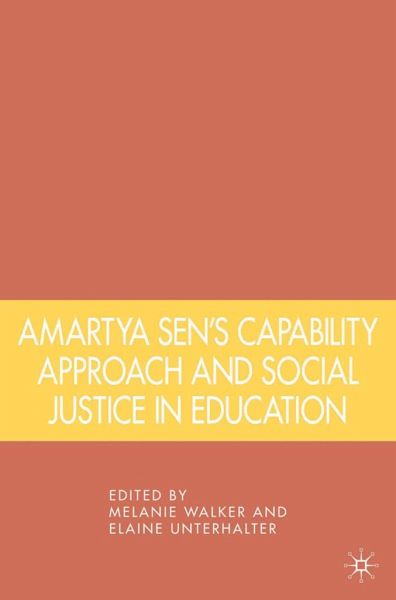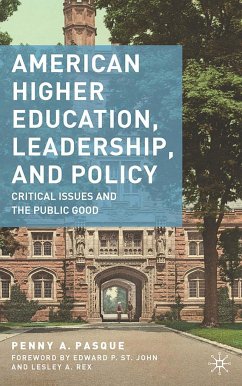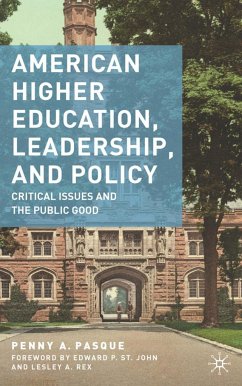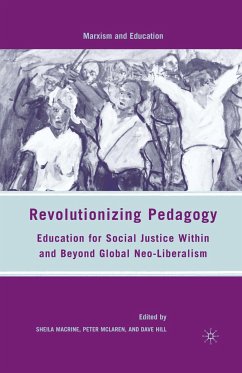
Amartya Sen's Capability Approach and Social Justice in Education
Versandkostenfrei!
Versandfertig in 6-10 Tagen
Weitere Ausgaben:

PAYBACK Punkte
19 °P sammeln!





This compelling book introduces Nobel laureate Amartya Sen's capability approach and explores its significance for theory, policy and practice in education. The book looks particularly at questions concerning the education of children, gender equality, and higher education. Contributors hail from the UK, USA, Australia, Italy and Mexico.
MELANIE WALKER is Professor of Higher Education and Director of Research in the School of Education at the University of Nottingham, UK and Extraordinary Professor at the University of the Western Cape, South Africa. She is director of a PhD program in Higher Education, and contributes to teaching on the MA in Higher Education and the Professional Doctorate. Her teaching and research interests focus on human development and global higher education policy; professional education, graduate capabilities, and university contributions to poverty reduction; and pedagogies and social justice. She is co-editor of the Journal of Human Development and Capabilities. Her recent books include Higher Education Pedagogies: a Capabilities Approach (2006); and The Routledge Doctoral Supervisor's Companion and The Routledge Doctoral Student's Companion, both edited with Pat Thomson (2010). ELAINE UNTERHALTER contributes to teaching on post graduate courses in education and international development at the Institute of Education in London, UK. She specializes in gender, education, and development and is currently leading two research projects with this focus: one funded by the ESRC and one by ActionAid. She has extensive experience editing collections of papers and journals. Her most recent edited collection is Oxfam's Beyond Access: Transforming Policy and Practice for Gender Equality in Education (with Sheila Aikman, 2005). She is one ofthe co-editors of the journal Theory and Research in Education.
Produktdetails
- Verlag: Palgrave Macmillan / Palgrave Macmillan US / Springer Palgrave Macmillan
- 2007 edition
- Seitenzahl: 277
- Erscheinungstermin: 10. August 2007
- Englisch
- Abmessung: 236mm x 149mm x 27mm
- Gewicht: 464g
- ISBN-13: 9781403975041
- ISBN-10: 1403975043
- Artikelnr.: 22716934
Herstellerkennzeichnung
Libri GmbH
Europaallee 1
36244 Bad Hersfeld
gpsr@libri.de
'Walker and Unterhalter have gathered together an impressive collection which debunks the notion that capabilities can be equated to a narrow definition of outcomes, qualities or competencies. This book offers exciting new possibilities for developing socially just approaches to education with our students.' - Pat Thomson, Professor of Education and Director of Research, School of Education, University of Nottingham, UK
'Amartya Sen's economic and political theory including, centrally, his work on the idea of human 'capability' as both a goal of and an indicator of development has had a major impact on both the theory and practice of international development and won him, among many honours, the Nobel Prize for Economics. It is a body of work which clearly invites application in the context of education, but this application has hitherto been neglected. Melanie Walker and Elaine Unterhalter have assembled an important, stimulating and perceptive collection of papers which clarify and explore both the theoretical framework of the capability approach and its practical application. This book deserves the attention of all those involved in considering the purposes of education and the measures of its success in any educational setting and will challenge those who measure this success in narrowly instrumental terms.' - David Bridges, Professorial Fellow, University of East Anglia, UK; Chair of the Von Hügel Institute, St Edmund's College, UK
'Amartya Sen's economic and political theory including, centrally, his work on the idea of human 'capability' as both a goal of and an indicator of development has had a major impact on both the theory and practice of international development and won him, among many honours, the Nobel Prize for Economics. It is a body of work which clearly invites application in the context of education, but this application has hitherto been neglected. Melanie Walker and Elaine Unterhalter have assembled an important, stimulating and perceptive collection of papers which clarify and explore both the theoretical framework of the capability approach and its practical application. This book deserves the attention of all those involved in considering the purposes of education and the measures of its success in any educational setting and will challenge those who measure this success in narrowly instrumental terms.' - David Bridges, Professorial Fellow, University of East Anglia, UK; Chair of the Von Hügel Institute, St Edmund's College, UK
Für dieses Produkt wurde noch keine Bewertung abgegeben. Wir würden uns sehr freuen, wenn du die erste Bewertung schreibst!
Eine Bewertung schreiben
Eine Bewertung schreiben
Andere Kunden interessierten sich für













